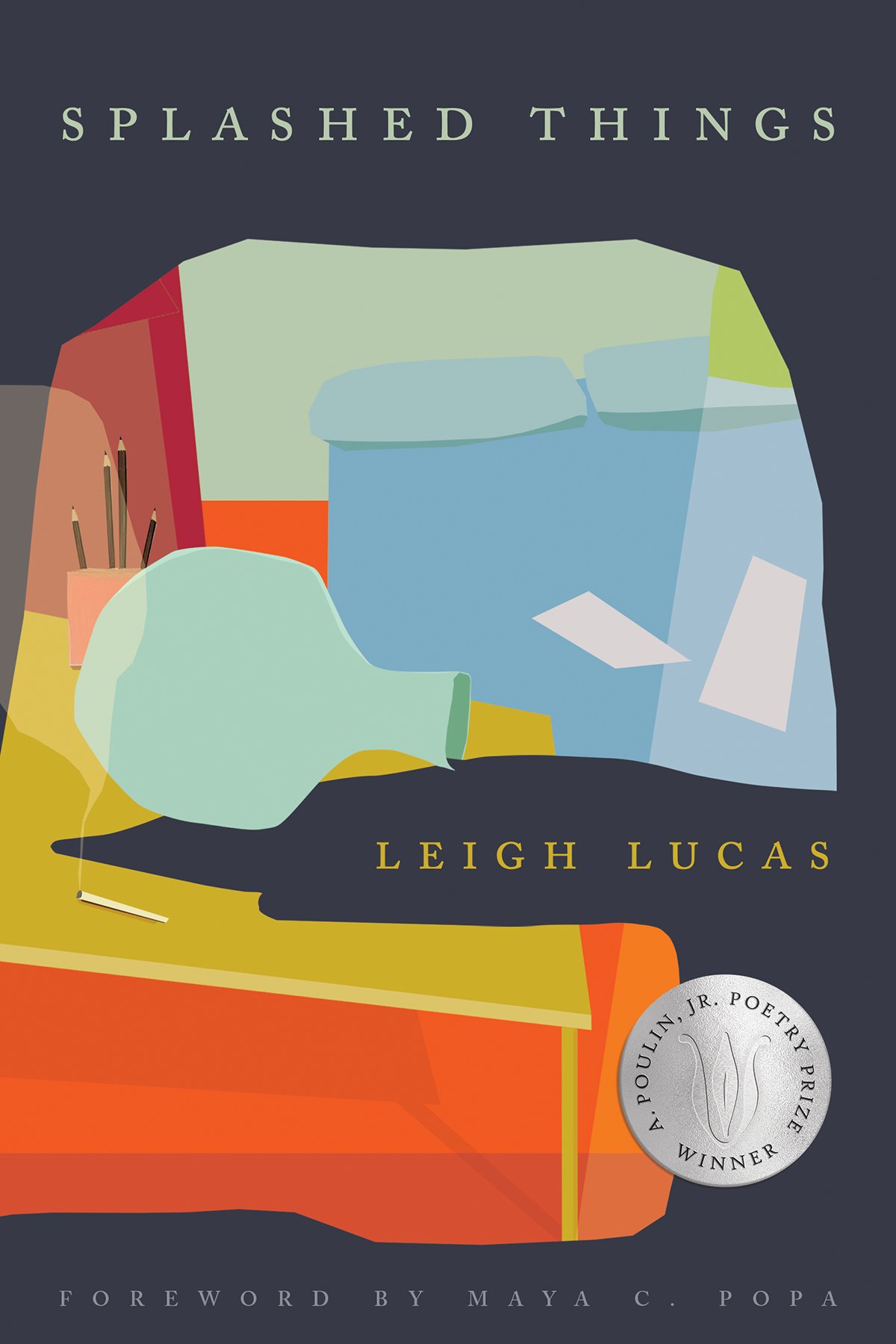Debut poetry collection coming April 7, 2026 from BOA Editions
Winner of the A. Poulin Jr. Poetry Prize
In selecting Splashed Things, final judge Maya C. Popa writes: "Profoundly affecting and finely crafted, this collection enacts the arc of grief from unthinkable pain towards eventual acceptance—even joy. Lucas writes with a moving candor and skill capturing the uncertainty, anger, and hopelessness experienced in the aftermath of suicide, and the mental and physical journey towards healing."
Advanced praise:
“Leigh Lucas transmits the lasting shockwaves of grief: the anger and bitterness, blame and shame, its landsickness, and the empty shapes into which we accumulate the things left, inside the private rooms we build around the negative space grief leaves in our lives. The memories called up again and again, involuntary, changing shape each time, words once spoken replaced with new words, drawing us both closer and farther away from who and what we miss. These poems are falling apart for love, are devastatingly honest, naked, bleeding, and brutally self-searching. I'll think about them forever.”
—Sarah Gerard, author of Binary Star
“A child’s hand in a fat grip on a fat crayon, puncturing crêpe paper” is how our speaker describes their poems. But our speaker is cataclysmically clever, and while these poems tolerate no fragile surface, their majesty far exceeds this devastating premise, allowing us into the private sacrifices a woman makes to protect the life that follows the death of the beloved. Never alone, and certainly never entirely defeated, Leigh Lucas renders the defiance, doubt, and ambition required to go on in grief with tenderheartedness and venom, humor hewn from absurdity and a sharpness of mind. Lucas reaches for complete transformation, gasping her new life with all that poetry empowers, and is most impressively real when everything fails. "The world will be unsettled,” our poet observes. “I will unsettle them.”
—Paul Tran, author of All the Flowers Kneeling
“I sing so he can cry,” writes Leigh Lucas in Splashed Things, her lucid portrait of a young woman devastated by great and unexpected loss. Into these deftly built and deeply moving poems, Lucas alchemizes the memory of grief and the grief of memory, with restraint, irreverence, and a devotion so total that I can only understand it as love. I don’t know a single person who could read this book with an open heart and mind and not be made more human.
—Charif Shanahan, Whiting Award-winning author of Trace Evidence: poems
____
LANDSICKNESS
Tupelo Press, 2024
Selected by Chen Chen for the Sunken Garden Chapbook Prize from Tupelo Press:
“Landsickness names and navigates a shattering grief in every possible way: through the pulse, via the intellect, from the shivering body and all its sweaters, over land, underwater, in the leaky vastness of night, in suffocating day, in a therapist’s questions, with rage and somehow humor, too. I could not stop reading this collection. Its candor startles. Its speaker seems to hold nothing back about how ungraceful, how ugly the grieving has been and is. Though of course it takes tremendous craft (grace) to sustain, vary, and expand such an effect for an entire (beautiful) work. Such a gift, these spacious pages, this space in which any feeling, however unruly, can walk through and receive the honor of vibrating attention. I mean—this is love. Read it now.” — Chen Chen
___________
Reviewed by The Poetry Foundation:
In Leigh Lucas’s startling chapbook, Landsickness, “Nights // Are each the same” as the speaker “lie[s] in bed and stare[s] into the messy monuments in search of signs from the beyond.” These “monuments” are precious objects belonging to a lover who died of suicide: “Shrines of his photographs, trinkets, and scraps of his handwriting form on my windowsills […] like birds’ nests.”
Lucas’s poems possess a tender vulnerability in their attempt to make sense of a world transformed in the aftermath of loss, when even “[w]alking the streets takes extreme effort,” when a dead phone leaves the speaker feeling “desperately lost.”
The poems in this book are untitled, giving the impression of one long poem with significant pauses that allow readers to focus on the speaker’s memories of her lover, and her reflections about his suicide:
What happens to a body thrown?
Some believe numbers govern splashes:
A high Reynolds number makes them tall; a high Weber
number makes them messy.
I appreciate attempts to lasso a slippery world, to number,
measure, and taxonomize.
The list-like quality of these lines, as well as the mention of Reynolds and Weber numbers—both related to fluid mechanics and dynamics—suggest ways of trying to understand and explain something that defies comprehension. At the same time, these lines serve as containers for the range of emotions experienced by the speaker.
In Landsickness, speculation and reality are not in opposition to each other, but rather offer different perceptions of the same event—
I seasick between: I knew this would
happen (rock). And, how could it have (rock). Between: I knew
him as well as I could know someone. And, I didn’t know him
at all. (Rock, rock.)
Reviewed By Leonora Simonovis

